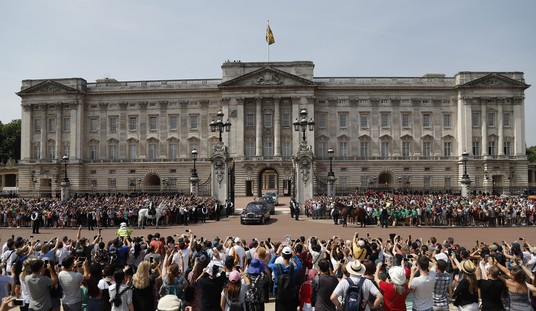Yes, you read that title correctly. According to the Associated Press, the Obama administration is close to changing course on Syria and supporting the removal of Bashar Assad from power.
The decision has not yet been made — and this is likely a calculated leak meant to deliver a last warning to Assad — but this is nonetheless a huge change in policy. An official has told the AP: “we are getting close” to demanding the Syrian dictator’s resignation. Apparently the language is already being crafted, with the report stating: “The first step would be to say for the first time that President Bashar Assad has forfeited his legitimacy to rule.” This will be coupled with language supporting a transition towards democracy — a softer way of saying two words the Obama administration is so reluctant to utter: “regime change.”
Earlier this month, the French foreign minister publicly predicted Assad would fall if his regime continued its methods: “If the regime perseveres down this path, it will fall one day or another, but it will fall.” An advisor to President Sarkozy also said: “The crimes of the Syrian regime are on the same level as the crimes in Libya.”
The Israeli defense minister contradicted reports that Israel fears the fall of Assad, saying: “I don’t think Israel should be alarmed by the possibility of Assad being replaced,” and that he is “approaching the moment in which he will lose his authority … the more people are killed, the less chance Assad has to come out of it.” Israeli President Peres said in April: “I believe finally that a democratic system in Syria is our best bet for the future.”
This change may be partly due to Secretary of Defense Gates, who boldly said: “The Egyptian army stood on the sidelines and allowed people to demonstrate and in fact empowered a revolution. The Syrians might take a lesson from that.” Senator John Kerry, who has met with Assad, now says attempts to engage Assad must now come to an end. “The chance was lost and that’s the end of it,” he said.
Only this January, Ambassador Robert Ford arrived in Damascus hoping to initiate a new era in Syrian-American relations. As the uprising began and innocents were slaughtered in the streets, the U.S. was slow to react and offered only condemnations of human rights abuses without any substantive change in policy. Secretary of State Clinton even said on March 27: “Many of the members of Congress of both parties who have gone to Syria in recent months have said they believe he’s a reformer.”
Now, the State Department spokesman is saying the “window is narrowing” and the condemnations on the Syrian regime have gotten harsher. The administration is also wisely pointing out the Iranian hand involved in the oppression. The White House has said it is working with the international community to respond to the violence. The U.S. has sanctioned three senior officials — which is a small but significant start — and is seeking access to a detained Al-Jazeera reporter covering the revolution.
The European Union has imposed an arms embargo and sanctioned 14 officials, leaving Assad out for the time being in the hopes the threat will change his behavior. The UN Human Rights Council approved a U.S.-sponsored resolution condemning the Syrian government and will investigate the brutal suppression, potentially paving the way for indictments. The UN also tried to deploy a humanitarian team to Dara’a that was denied access by the regime on May 10, and the UN Development Program has suspended operations in Syria.
At the same time, the International Atomic Energy Agency has confirmed that the site destroyed in September 2007 — in an operation everyone attributes to Israel — was indeed a secret nuclear reactor. Syria is still refusing to grant access to other sites suspected of being part of a covert nuclear weapons program. The IAEA’s report is due next month, adding another layer of pressure on the Assad regime. And all of this is happening as the UN Special Tribunal investigating the 2005 assassination of former Lebanese Prime Minister Rafiq Hariri has prepared indictments for Hezbollah officials and quite possibly Syrian officials.
The pieces are falling together for tough international action against the Assad regime at precisely the time it is most vulnerable.
It is imperative that the West move fast, as the Interior Ministry has given protesters until May 15 to turn themselves in.
Senator Joe Lieberman has offered multiple good suggestions on how the U.S. can support regime change in Syria. There should be more sanctions on Syrian officials, including Assad himself, and those overseeing the violence should be publicly warned that they face prosecution through the International Criminal Court. An international coalition should deliver humanitarian aid to the cities under siege and equipment to help restore severed communications from the information blockade.
Congress should immediately propose a bill similar to one just introduced designed to support the Iranian opposition. It forbids any company from selling equipment that can be used for repression, from batons to internet filtering software, and threatens them with sanctions. Additional measures can also be taken, including pushing for sanctions for Syria’s lack of cooperation with the IAEA, and pressing the UN Special Tribunal to release its indictments. American and European officials should meet with Syrian dissidents that are secular liberals and calling for their release, especially those from the Allawite minority that the Assad regime draws its ranks from.
If Mubarak and Gaddafi deserved to fall, then Assad — who has the blood of American soldiers on his hands and is a major support of terrorism — certainly does as well.
Update: Read Syria shells residential neighborhoods; UN, Obama, silent at the Tatler.









Join the conversation as a VIP Member